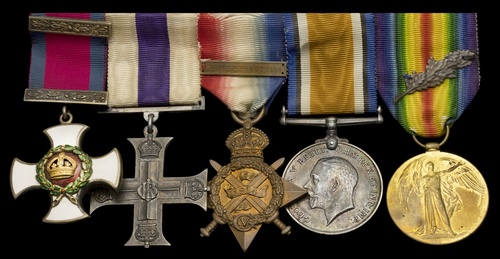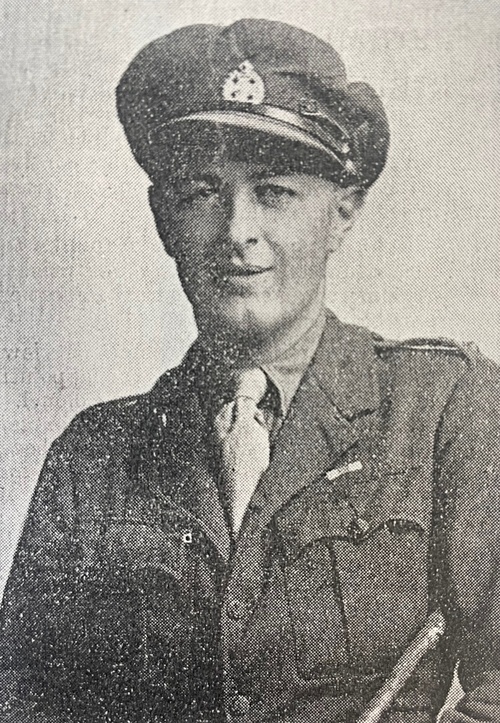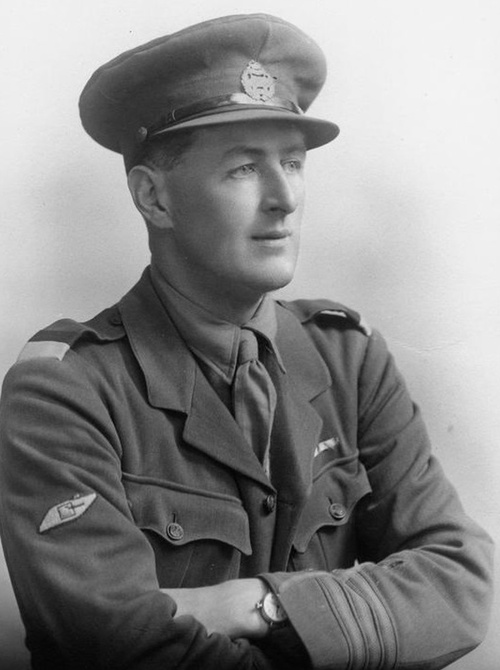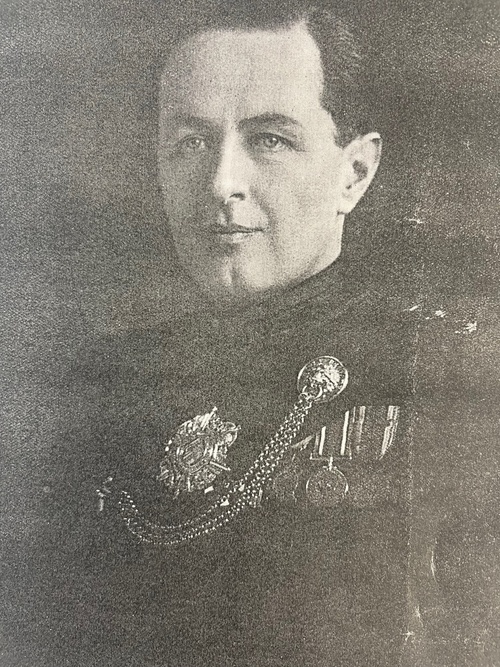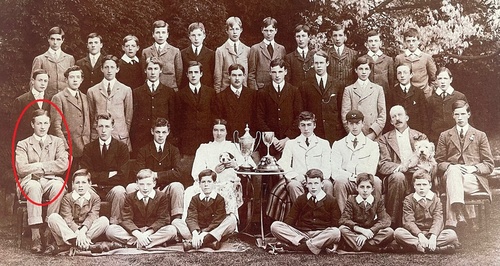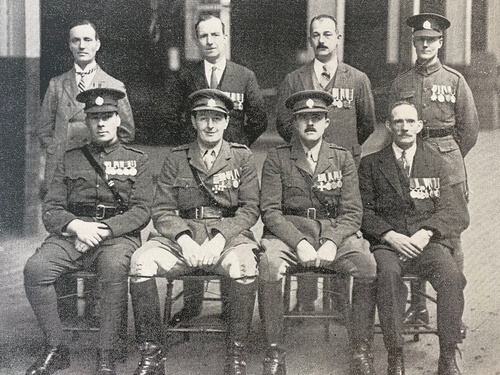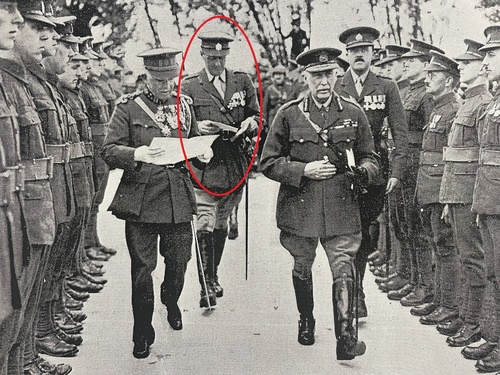Auction: 24003 - Orders, Decorations and Medals
Lot: 176
An outstanding Great War D.S.O., M.C. group of five awarded to Brigadier General J. Micklem, 1st Battalion, Rifle Brigade (The Prince Consort's Own)
Micklem commanded the Machine Gun Section during the early actions of 1914, earning his first 'mention' and being wounded in action on 19 December 1914; he thence rose to Battalion Command with the 1/6th (Territorial) Battalion, Gloucestershire Regiment, with whom he took both his decorations from July 1915-January 1917, including their famous share in the Somme Battles, when he was the youngest CO on the Order of Battle
Thence with the embryonic Tank Corps, he was wounded for the second time on the First Day of the German Spring Offensive whilst CO of the 10th Battalion and closed out the conflict commanding the 4th Tank Brigade - he finished the Great War with no less than five 'mentions' and commanded the London Rifle Brigade from 1924-29
Distinguished Service Order, G.V.R., with top riband bar adapted for mounting; Military Cross, G.V.R.; 1914 Star, clasp (Lieut. J. Micklem. Rif. Brig.); British War and Victory Medals, with M.I.D. oak leaves (Brig. Gen. J. Micklem.), mounted as worn, good very fine (5)
D.S.O. London Gazette 20 October 1916:
'For the excellent handling of his Battalion, notably on two occasions during heavy counter-attacks by the enemy.'
M.C. London Gazette 14 January 1916.
M.I.D. London Gazette 17 February 1915, 1 January 1916, 4 January & 25 May 1917.
John Micklem - or Jack to his friends and comrades - was born on 13 September 1889 and was educated at Winchester College and the Royal Military Academy, Woolwich. He joined the 2nd Battalion, Rifle Brigade as a 2nd Lieutenant in Ireland in February 1910. Being advanced Lieutenant in 1911, by 1914 he was a Captain. With the outbreak of the Great War, his Section were sent down to Harwich Docks to swiftly prepare blockhouses on the beaches. They were soon called to sent off the last German citizens from British soil, as recalled by Sergeant Brooks, D.C.M., M.M. in the Rifle Brigade Journal of June 1964:
'Nexy day we paraded on the Docks in front of a big liner which was crowded with passengers. Mr Micklem, our Officer, told us that we, as Guard of Honour to the German Ambassador and his Staff, were taking part in an historical event that had never happened in the history of England before.
We waited for a while, then suddenly all was bustle and the Ambassador appeared with his wife; she was crying into her handkerchief. We 'Presented Arms', the Ambassador looked at us, touched his forehead and then went on board. Some of the passengers were singing Deutschland Uber Alles while half a dozen dockers, not to be outdone, were whistling Rule Britannia.
This was the last we saw of the Germans on English soil, but it wasn't long before we met them again - at Le Cateau on 25 August.'
He was to serve in France as Machine Gun Officer with the 1st Battalion, Rifle Brigade from 5 August 1914, sharing in their early campaigns on the Western Front. He admirably commanded his Gunners during including the actions at Le Cateau when they operated near 'I' Company and '...kept up an unceasing fire at good targets'. During the Retreat to the Marne, he re-joined the Battalion at Sempigny by 29 August, having marched his Section independently via Peronne, having picked up the 1st Line Transport who had been missing for several days. It can be no surprise his name was put forward on 24 November for his good work, this was promulgated early the next year as his first 'mention'.
Micklem would be wounded for the first time during the attack on the enemy trenches on 19 December 1914 at 'Plugstreet' Wood. The unit formed up by 1430hrs on that day and the leading Platoons and House Parties went forth out of the Woods to attack the German-held houses which stood in their way. Captain Morgan-Grenville was sniped from the third House almost immediately. Micklem and his Gunners pressed forward to the Second House and took it. The enemy fire was intense and soon meant they were held up and taking casualties. Without much chance of a final success, by 1755hrs a withdrawal was made. Casualties had been 3 Officers and 23 Other Ranks killed, with a further 3 Officers (including Micklem) and 42 Other Ranks wounded.
Recovered and noted for his supreme leadership abilities, he would soon end up with his own Battalion. The would be the 1/6th Battalion, Gloucestershire Regiment, who came under his charge from 10 July 1915-7 January 1917. During that period Micklem would be made a Temporary Brigadier-General in November 1915 and be the youngest Commanding Officer on the Order of Battle during the First Day of the Battle of the Somme, being just 26 years and 9 months in age. It was for his actions during the Somme Battles, notably the Battle of Pozières Ridge, that he took his D.S.O., leaving a full account of the costly attack made by his unit. In early 1917, he was sent as Instructor to the Senior Officers' School in England and was made Officer Commanding of the 10th Battalion, Tank Corps in July 1917, taking them over to France in December 1917.
He would be wounded for a second time on the First Day of the German Spring Offensive, 21 March 1918, when his Battalion HQ hut was shelled. It was clearly of a relatively severe nature as it was not until 22 May 1918 that he returned to duty, re-assuming command on 23 May 1918. He stayed with his Battalion and was also sent off as Tank Advisor to General Head Quarters on 27 August 1918. Commanding the 4th Tank Brigade from October 1918, he was made Brigadier-General on 5 November 1918.
With the end of the Great War, Micklem returned to England and by 1924 was appointed to the command of the 5th (City of London) Battalion (London Rifle Brigade), a position held through till 1929. In August 1924, his campaign Medals were re-issued and he led the visit to France in 1927 to the places he had fought in the Great War.
Retired to Aylesbury, Buckinghamshire and a member of White's Club, he died February 1952. A comrade wrote:
'Jack was an outstanding personality, a great leader and a born commander of men. He was always full of enthusiasm for anything he took up and possessed exceptional drive and energy. His outstanding record in the First World War speaks for itself...The Regiment was always his first interest and many were the Riflemen who went to him for advice and help. He had the most cheerful disposition and one always felt better for meeting him. At his home he was a delightful host and a great gardener. He was never happier than when surrounded by his family and their friends...and it is hard to believe that such a live personality has passed away.'
Sold together with copied research and Journal extracts.
For his miniature dress Medals, please see Lot 305.
Subject to 20% VAT on Buyer’s Premium. For more information please view Terms and Conditions for Buyers.
Sold for
£2,500
Starting price
£2500

